Lawyers, Rights Groups Make Suggestions to Draft Law on Domestic Violence
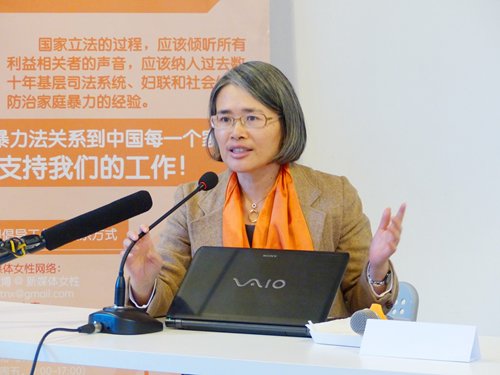 |
|
Feng Yuan, member of the Civil Advocacy Group of the Law on Domestic Violence, talks about China's draft law on domestic violence in Beijing on December 15. [Women of China/Yao Yao] |
Lawyers and rights groups held a press conference in Beijing on December 15, 2014 to discuss their suggestions to help improve China's new draft law on domestic violence.
The Legislative Affairs Office of the State Council unveiled the draft law on domestic violence on November 25, 2014 via its website and requested that the public make suggestions on how to refine and improve the proposed legislation.
The Civil Advocacy Group of the Law on Domestic Violence, organizer of the press briefing, unveiled and explained its suggestions to the journalists present.
Having first studied each article of the draft law, organized discussion seminars, and conducted a number of different surveys, the group at the press conferenced summarized its 41 suggestions, which aim to reflect to the State Council the needs of all parties related to the anti-domestic violence efforts.
Li Ying, a Beijing-based lawyer who penned the suggestions, said that the new law represents a key milestone for China and its anti-domestic violence efforts.
"The draft law has four principal features: a breakdown of the government's responsibilities, measures for prevention, protection of the young and the elderly, and more supportive methods," said Li.
Li said that their suggestions will be submitted to the Legislative Affairs Office of the State Council before December 25, the date on which the office will wrap up its program for soliciting public opinion.
The suggestions focused mainly on the cooperation of different organizations and put forward the notion that sexual violence should be defined as a form of domestic violence.
"In addition to physical violence, the draft law has defined domestic violence to include emotional violence. This is progress, but it's not enough," said Li. "We suggest that the defined forms [of domestic violence] include sexual violence and financial control."
"As we know, sexual violence occurs in many of the domestic violence cases. But more importantly, the most serious domestic-violence cases all involve sexual violence," Li added. "If this issue is not defined, proper protection for domestic-violence victims is not entirely in place."
"So we believe it should be defined [as a form of domestic violence]. And it has been defined in international conventions and laws of other countries," said Li.
Li expressed her belief that referring to the cooperation of different organizations in the field of domestic violence is an effective way to deal with this issue.
"It is a complicated job to deal with domestic violence, and no organization can do it on its own, as the work involves a number of different individuals and fields, including law enforcement, court of law, medical care, education, civil affairs and legal aid," said Li. "So cooperation between different organizations is needed, and social organizations should be encouraged to do their part in stopping domestic violence."
Based on her past experiences, Wang Guohong, member of the Civil Advocacy Group of the Law on Domestic Violence, pointed out that a leading organization is needed to coordinate the cooperation of different organizations and that a special budget should be granted for this cooperation.
At the press briefing, Xu Bin, member of the civil advocacy group and head of lesbian rights group Tongyu, used statistics to explain why violence between intimate partners should be prohibited by the anti-domestic violence law.
According to a survey by Tongyu in 2008, 68.97 percent of women in sexual minority groups experienced domestic violence from family members or intimate partners.
"The draft protects only married couples but not unmarried ones," said Xu. "We wish for the draft to define violence between intimate partners — including that between intimate same-sex partners — as a form of domestic violence."
Feng Yuan, another member of the Civil Advocacy Group of the Law on Domestic Violence, agreed with Xu. "If the future law does not include intimate partners, ex-partners and divorced couples, many people will be left unprotected," said Feng.
In the middle of the press conference, three domestic-violence victims or their relatives made an appearance and shared the tragic stories of their married life or intimate same-sex relationship.
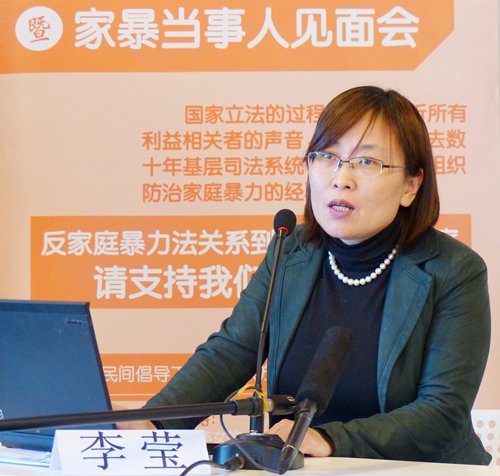 |
|
Beijing-based lawyer Li Ying explains major points of suggestion for improving China's draft law on domestic violence, in Beijing on December 15. [Women of China/Yao Yao] |
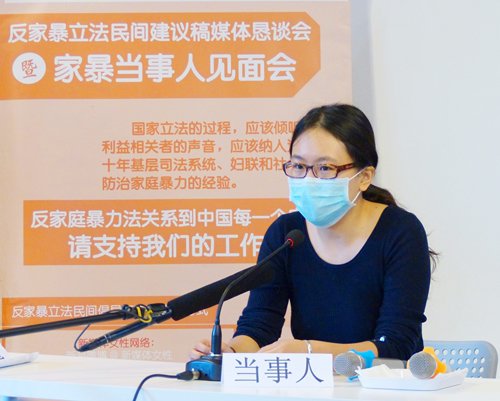 |
|
Domestic-violence victim Lu Manman [Women of China/Yao Yao] |
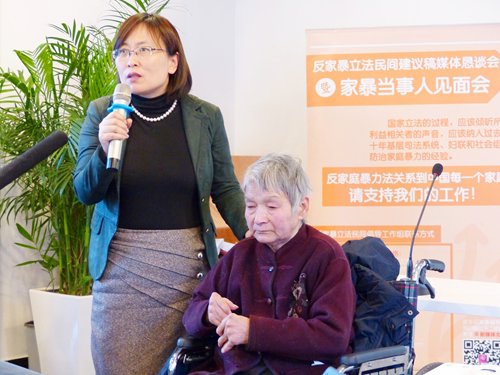 |
|
Beijing-based lawyer Li Ying introduces the case of Cui Lanzhi [R] in Beijing on December 15. [Women of China/Yao Yao] |
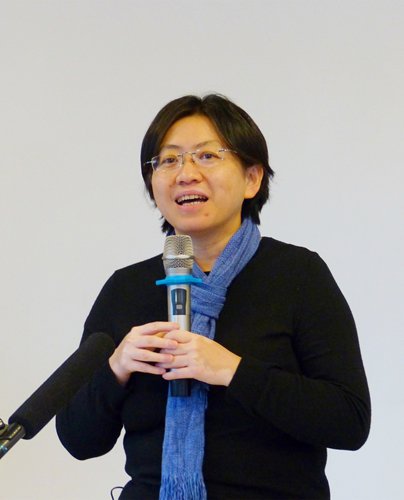 |
|
Xu Fen, member of the Civil Advocacy Group of the Law on Domestic Violence and head of lesbian rights group Tongyu [Women of China/Yao Yao] |
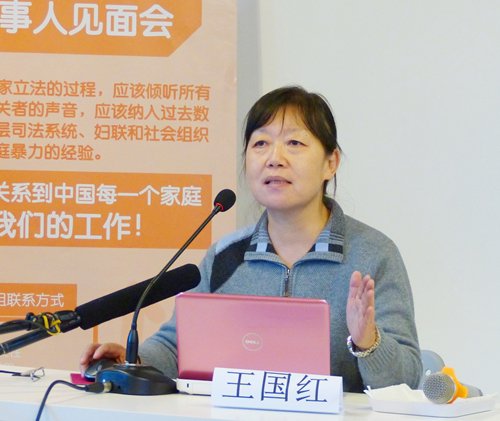 |
|
Wang Guohong, member of the Civil Advocacy Group of the Law on Domestic Violence [Women of China/Yao Yao] |
Please understand that womenofchina.cn,a non-profit, information-communication website, cannot reach every writer before using articles and images. For copyright issues, please contact us by emailing: website@womenofchina.cn. The articles published and opinions expressed on this website represent the opinions of writers and are not necessarily shared by womenofchina.cn.

 京公网安备 11010102004314号
京公网安备 11010102004314号